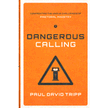Counselors Reflect on Dangerous Calling by Paul Tripp
A Series to Care for the Care Takers of God’s People
“Maturity is a vertical thing that will have a wide variety of horizontal expressions. Maturity is about relationship to God that results in wise and humble living (p. 64).”
I decided to make this a two-part (or maybe three, we’ll see) post on a subject that as I began writing realized that it was taking on a life of its own and would not allow me to confine it to one post. The more I wrote the more I saw that needed to be fleshed out that one blog would not be sufficient. Also this area is particularly close to my heart, has been a theme of my recent devotionals, and something I have struggled with personally and took some time for me to reconcile in my own mind and heart before God. I have also seen others who I counsel wrestle with this as well and have tried to encourage them with some of the same things God’s word and Spirit have taught me. While I think this certainly will be helpful for pastors and leaders it is not solely or even primarily for that category of believers but is more generally applied to all Christians which pastors and ministry leaders can hopefully gain insight from. So, I want to talk about holiness. In fact I want to make the case that the above quote and much of what Dr. Tripp writes about in Dangerous Calling is defining an explaining holiness. He just does not use that specific term. Here he describes it as maturity. First, I’d like to start with what I think are some common beliefs or thoughts about what holiness is and is not and then end this post with some general differences between holiness and legalism and then expand on them later.
When you hear the word holiness what comes to mind? For many Christians holiness is something you do versus someone you are. It becomes a set of right things a person does and has a connotation of behavior modification. For many holiness has become synonymous with legalism. It feels divorced from a person’s character and is something outside an individual and not part of or intrinsic to that person. I often come across counselees who struggle with holiness because they misinterpret it as legalistic and the argument is made that they feel uncomfortable doing things they know is right because their hearts are not in it. Many become paralyzed and cannot pray, read and study God’s word, go to church, get involved in their community etc. because if they are not doing it for the right reason they should not do it at all. To a certain extent this is understandable. Many Christians who understand the message of grace in the gospel and the importance of loving Christ being the primary motivator for change tend to now be more resistant to doing right things and good behavior because they fear getting caught in the legalism trap. They don’t want to fool themselves into believing they are right with God because of their actions while their hearts are separated from real relationship with and affection for God. It is a slippery slope when it comes to maintaining a right heart and doing good things out of love for Christ and those same good things becoming rote and routine and form of self-justification and salvation by works. The predominant theme and thrust of Dr. Tripp’s message in Dangerous Calling is essentially that pastors ought to beware of legalism and thinking their knowledge, skills, gifts, and what they do makes them right with God. And he’s right. Most pastors don’t usually suffer from fearing their works will turn into legalism. Theirs is the temptation that not doing these works will put them out of favor with God. They don’t know how to stop doing without fear of losing themselves and perhaps their salvation in the process. Ministry is so tightly woven into their identity they don’t know who they are without it.
However, as Dr. Tripp states, maturity if first about relationship with God which has its expression in the actions we take and the decisions we make. As stated in the introduction, I believe Dr. Tripp is talking about and defining holiness in the true sense of the word. Holiness is not legalism. Here are some differences that are worth highlighting and expanded on later. 1) One difference is motive. Legalism is action that stems from a heart trying to find its identity and worth in what a person does, while holiness stems from a heart that already is secure in its identity and does things out of the outflow of that sure identity in Christ. 2) Also holiness is never divorced or separate from a person’s character but encompasses the whole of who they are. 3) And finally holiness is primarily faith driven not feeling driven.
In my next post we’ll expound on these three points.
 |
Dangerous Calling: Confronting the Unique Challenges of Pastoral Ministry By Paul David Tripp / Crossway Books & Bibles |